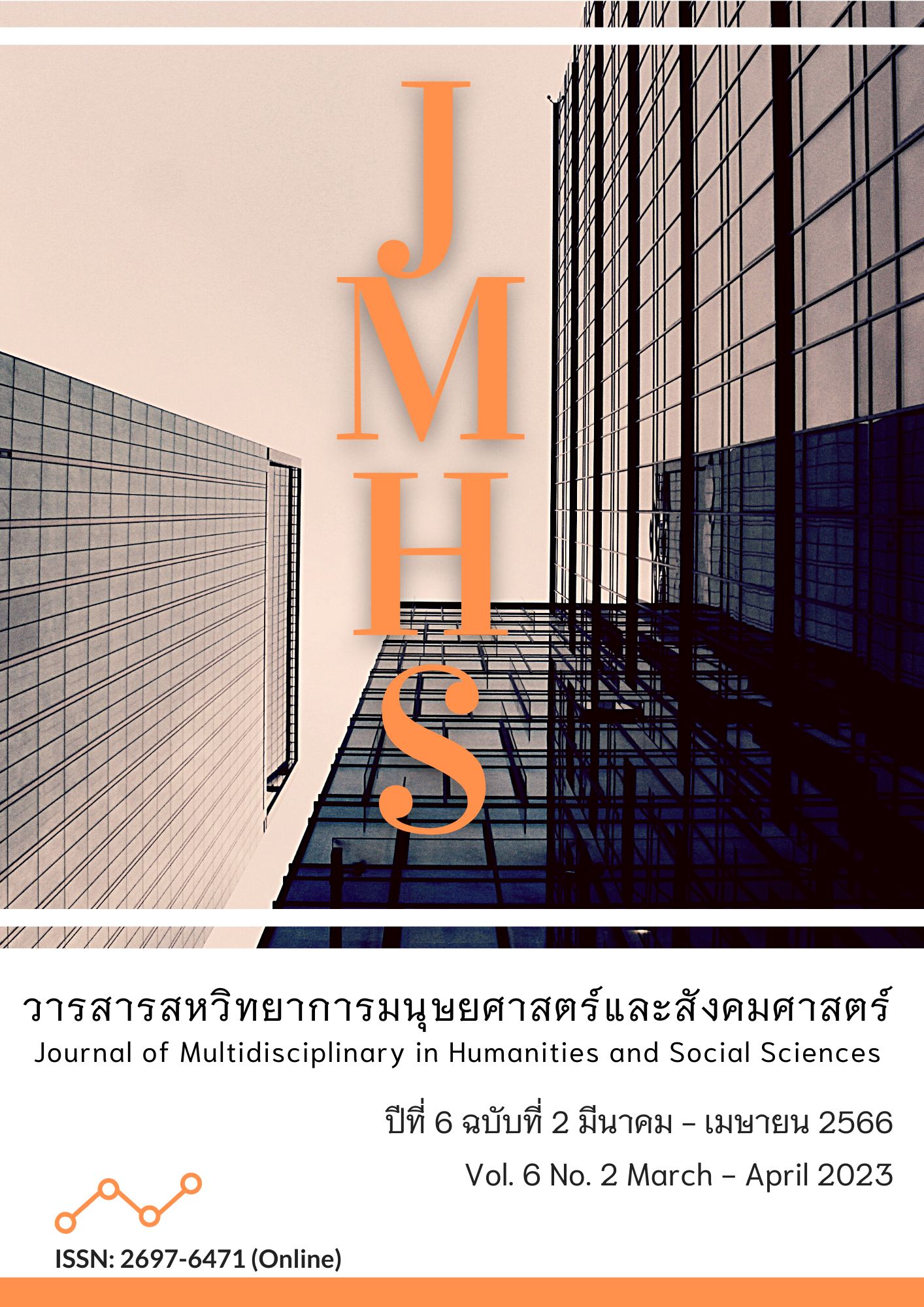The Development of the Learning Management Process of Sufficiency Economy Learning Center through Participatory in Na Tam Nuea Community, Mueang District, Trang Province
Main Article Content
Abstract
The article aimed to study 1) the learning management situation of sufficiency economy learning and 2) the development of the learning management process of the sufficiency economy learning center through participatory action research in the Na Tam Nuea community, Mueang district, Trang province. The research was action research and was divided into two phases: Firstly, the situation of the learning management process was collected through in-depth interviews with twenty-three key informants and satisfaction questionnaires of three hundred forty-nine training participants. Secondly, the development of the learning management process in the Na Tam Nuea community was collected through a PAOR participatory process according to the Addie Model guidelines with thirty-six stakeholders, namely learning center officers, farmers, teachers, village headmen, community development officers, and analysts of plans and policies. The data were analyzed by descriptive statistics and the qualitative data by content analysis.
The research results were found as follows: 1. The sufficiency economy learning center is the community’s learning resource, providing knowledge on agriculture. The crucial problems of the learning center are inconsistent training courses with the context and a lack of learning media and communication channels. The community has requirements for learning and activity contents, lecturers, training participants, and environments. The training participants satisfaction with learning management was high. 2. The knowledge research of the development learning management process of the sufficiency economy learning center through the community performed five steps, namely community analysis, design, development, implementation, and evaluation of learning management.
Article Details

This work is licensed under a Creative Commons Attribution-NonCommercial-NoDerivatives 4.0 International License.
Views and opinions appearing in the Journal it is the responsibility of the author of the article, and does not constitute the view and responsibility of the editorial team.
References
กระทรวงเกษตรและสหกรณ์. (2560). กรอบแนวทางการขับเคลื่อนเกษตรกรรมยั่งยืน กระทรวง เกษตรและสหกรณ์ (พ.ศ. 2560 – 2564). กรุงเทพฯ: สำนักงานปลัดกระทรวงเกษตรและสหกรณ์.
กิดานันท์ มะลิทอง. (2543). เทคโนโลยีการศึกษาและนวัตกรรม. กรุงเทพฯ: จุฬาลงกรณ์มหาวิทยาลัย.
ประพันธ์ นึกกระโทก. (2557). ทุนทางสังคมกับการจัดการความรู้สู่องค์กรชุมชนพึ่งพาตนเองอย่างยั่งยืนในภาคตะวันออกเฉียงเหนือตอนล่าง(วิทยานิพนธ์พุทธศาสตรดุษฎีบัณฑิต). มหาวิทยาลัยมหาจุฬาลงกรณราชวิทยาลัย.
พระธรรมปิฎก (ป.อ. ปยุตโต). (2544). การพัฒนาที่ยั่งยืน. กรุงเทพฯ: โรงพิมพ์เรือนแก้ว.
พระราชบัญญัติการศึกษาแห่งชาติ. (2562, 1 พฤษภาคม). ราชกิจจานุเบกษา. ฉบับที่ 4. เล่ม 136 ตอนที่ 57 ก, หน้า 49.
ระวี จูฑศฤงค์ และคณะ. (2564). ความพึงพอใจต่อการจัดสภาพแวดล้อมเอื้อต่อการเรียนรู้ของนิสิตในฟาร์มนิสิตสาขาเกษตรและสิ่งแวดล้อม. วารสารศาสตร์การศึกษาและการพัฒนามนุษย์, 5(1), 11-25. สืบค้นจาก https://kuojs.lib.ku.ac.th/index.php/jehds/article/view/4174/1998
สันติ ศรีสวนแตง. (2556). การพัฒนาโรงเรียนต้นแบบการจัดการเรียนรู้เกษตรและสิ่งแวดล้อมศึกษาโดยใช้สวนเป็นฐาน. กรุงเทพฯ: มหาวิทยาลัยเกษตรศาสตร์.
สำนักงานคณะกรรมการพัฒนาเศรษฐกิจและสังคมแห่งชาติ. (2546). การพัฒนาทุนทางสังคมเพื่อการพัฒนาอย่างยั่งยืน. กรุงเทพฯ: สำนักงานพัฒนาสังคม.
สำนักงานคณะกรรมการพัฒนาเศรษฐกิจและสังคมแห่งชาติ. (2560). แผนพัฒนาเศรษฐกิจและสังคมแห่งชาติ ฉบับที่สิบสอง พ.ศ. 2560-2564. กรุงเทพฯ: สำนักงานคณะรัฐมนตรี.
สำนักงานเลขาธิการสภาศึกษา. (2552). ข้อเสนอการปฏิรูปการศึกษาในทศวรรษที่สอง 2552-2561. กรุงเทพฯ: สำนักงานเลขาธิการสภาศึกษา กระทรวง
ศึกษาธิการ.
สำนักเสริมสร้างความเข้มแข็งชุมชน. (2560). คู่มือศูนย์เรียนรู้และขับเคลื่อนปรัชญาของเศรษฐกิจพอเพียง. สมุทรปราการ: ครีเอทีฟเวฟ.
สุเมธ ตันติเวชกุล. (2542). การดำเนินชีวิตในระบบเศรษฐกิจพอเพียงตามแนวพระราชดำริในวันพัฒนา. กรุงเทพฯ: กรมพัฒนาชุมชน.
สุวิธิดา จรุงเกียรติกุล และคณะ. (2557). การประเมินผลการดำเนินงานการศึกษานอกระบบและการศึกษาตามอัธยาศัย ของสำนักงาน กศน. ตามแนวพระราชบัญญัติส่งเสริมการศึกษานอกระบบและการศึกษาตามอัธยาศัย พ.ศ. 2551. วารสารครุศาสตร์. 42(3), 75-92. สืบค้นจาก https://so02.tci-thaijo.org/index.php/EDUCU/article/view/26022/22067
อภิชาติ ใจอารีย์. (2559). กระบวนการมีส่วนร่วมแบบพหุภาคีเพื่อการจัดการสิ่งแวดล้อมอย่างยั่งยืน. กรณีศึกษาการจัดการป่าชุมชนบ้านพุเตย จังหวัดกาญจนบุรี. วารสารมหาวิทยาลัยศิลปากร, 36 (1), 111-136. สืบค้นจาก https://so05.tci-thaijo.org/index.php/sujthai/article/view/57589/47708
อรวรรณ ป้อมคำ. (2561) การขับเคลื่อนศูนย์การเรียนรู้ตามหลักปรัชญาของเศรษฐกิจพอเพียงในสถานศึกษา สังกัดสำนักงานเขตพื้นที่การศึกษาประถมศึกษาลพบุรี เขต 2. กรุงเทพฯ: กระทรวงศึกษาธิการ.
อัชรา เอิบสุขสิริ. (2556) จิตวิยาสำหรับครู. กรุงเทพฯ: จุฬาลงกรณ์มหาวิทยาลัย.
อาภรณ์ ใจเที่ยง. (2553) หลักการสอน. กรุงเทพฯ: โอเดียนสโตร์.
โอภาศ วุฒิเศลา และคณะ. (2560). การจัดการแบบมีส่วนร่วมในการจัดการเรียนรู้ตามหลักปรัชญาของเศรษฐกิจพอเพียงของสถานศึกษาขั้นพื้นฐาน. วารสารรำไพรรณี, 11(2), 110-119.
Bloom, B.S. (1975). Taxonomy of Education Objective Handbook on Formative and Sumative Evaluation of Student Learning. New York: David Mckay.
Chantarasombat, C. (2009). Development of knowledge management plan from practice focusing on student centered. Faculty of Education, Mahasarakham University.
Cohen, J. M., & Uphoff, N. T. (1981). Rural Development Participation: Concept and Measures for Project Design Implementation and Evaluation. Rural Development Committee Center for International Studies. New York: Cornell University.
Pairote B., Chalard C. & Adul, P. (2022). The Development of Knowledge Management Program for The Leader on Self-Reliant Melientha Suavis Pierre Growing Learning Center Based on Sufficiency Economy Philosophy in Thailand. Multicultural Education, 8(1), 39- 48. Retrieved from http://ijdri.com/me/wp-content/uploads/2022/01/5.pdf
Putnam, R. (1993). Making Democracy Work: Civic Traditions in Modem Italy. New Jersey: Princetion University.
Seel, B., & Glasgow, Z. (1990). Exercise in Instructional Design. Ohio: Merrill Publishing Company.
United Nations Educational, Scientific and Cultural Organization. (2013). Towards a Sufficiency Economy: A New Ethical Paradigm for Sustainability. Retrieved from https://unesdoc.unesco.org/ark:/48223/pf0000223026?posInSet=3&queryId=0f8cae67-b36c-4067-9c64-779b6a57cd2e


